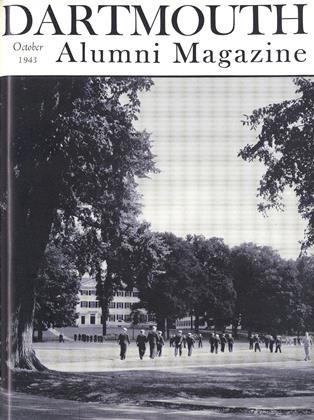Prouty '31. University of Missouri, 1942,pp. 305, $2.50.
This volume is a worthy successor to Dr. Prouty's valuable biography George Gascoigne: Elizabethan Courtier, Soldier, and Poet. The "hundred sundry flowers" are a hundred diverse lyrical poems accompanied by Gascoigne's prose framework. The first fourteen are scattered through a curious tale; "The Adventures of Master F. J.," which has considerable merit as an embryonic psychological novel unspoiled by Italian influence. Most of the poems, however, have no enduring vitality: they are imitations of Petrarchs' sonnets and Chaucer's Troilus and similar models. In such verse, individuality seldom appears, and we need not wonder that the Hundreth SundrieFlowres has often been regarded as an anthology. A dogmatic theory of multiple au- thorship was advanced some years ago by Mr. B. M. Ward, one of the people who believe that the 17th Earl of Oxford wrote the works of Shakespeare. The "discovery" of non-existent cyphers and other mare's-nests was used to "prove" Oxford responsible for sixteen of the hundred flowers,—a ragged garland, at best. Prouty thoroughly demolishes this notion, and builds up a strong case for attributing the entire contents of the volume to Gascoigne. There seems to be no good reason for disputing this attribution now; and scholars whose training makes them competent to appreciate the peculiarities of Elizabethan. literature will certainly welcome this new edition of the Flowres as the best ever published. Our understanding of the Renaissance depends not only on our ability to recognize the nature of genius but also on our appreciation o£ such minor talents as Gascoigne's; and such an appreciation is made possible by Dr. Prouty's intelligent editorial work.
H. M. DARGAN.
 View Full Issue
View Full Issue
More From This Issue
-
 Article
ArticleDartmouth War Directory
October 1943 -
 Article
ArticleTHE GIFTED CROSBYS
October 1943 By L. B. RICHARDSON '00 -
 Article
ArticleA LESSON IN ADAPTABILITY
October 1943 By H. F. W. -
 Class Notes
Class Notes1937
October 1943 By JOHN H. DEVLIN JR., FRANCIS T. FENN, JR. -
 Class Notes
Class Notes1918
October 1943 By EARNEST H. EARLEY, DONALD L. BARR -
 Class Notes
Class Notes1917
October 1943 By MOTT D. BROWN JR., DONALD BROOKS
Books
-
 Books
BooksEDITOR’S PICKS
MARCH | APRIL -
 Books
BooksAPPLIED PSYCHOLOGY
May 1934 By C. N. Allen -
 Books
BooksVOICES IN COURT – A TREASURY OF THE LAW.
JANUARY 1959 By DONALD L. STONE -
 Books
BooksObserving Life
JAN./FEB. 1978 By R.H.R. -
 Books
BooksCOMMUNICATING WITH EMPLOYEES.
NOVEMBER 1963 By ROBERT H. GUEST -
 Books
BooksANALYTIC GEOMETRY.
December 1936 By Robin Robinson '24

